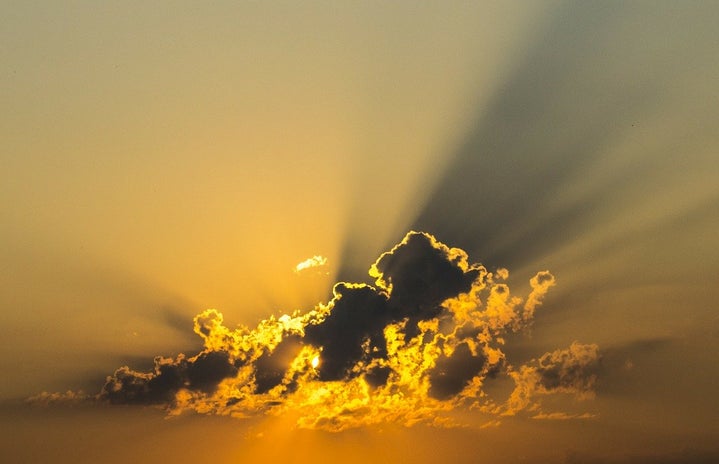Soy Guatemalteca
If I could eat frijoles con huevo, queso, crema, maduros y jugo natural con tortillas hechas a mano as breakfast for the rest of my life, I would be the happiest girl on this planet. If I could feel the sun’s scorching heat bathing my body with the sweet blanket of tanner skin, I would relinquish my paleness from winters past and never ask for it back. If I could listen to the cacophonous chants of the tirelessly hard working venderores selling sillas, mesas, cocos, y corbatas at the foot of my doorsteps, my ears would get up and open the door to receive them. The aroma of Pollo Campero mixed with the scent of fresh bread at every corner, dash of dewy tierra del monte, and puff of pollution from passing camionetas, whisked to perfection, creates the recipe that is my country, Guatemala.
To the average person, brown eyes are basic, but to me they are the coffee beans that the campesino collects as proof que mi sangre es un cafecito Guatemalteco. My black curls are the rugged vines and roots surrounding the Mayan ruins that encompass my scalp. I can say with complete certainty that I love where I come from. I love my Mayan ancestors, my cousins and uncles from generations past, and the family history that slowly builds as every new member of the Valiente/Salazars continues the never-ending story. I love my culture, my language, mi tierra, but it wasn’t always this way. I wasn’t always so proud of who I was. In fact, I used to hate myself.
La Gringa que Chinga
I am the first person in my family to be born and raised in the United States and if you’re Latinx, you know that my entire life I was referred to as la gringa de la familia. What a title. At every family gathering I would have aunts and uncles pinch my cheeks and tell me I was the cutest gringa in the family (I was, of course, the only gringa so by default I was both the cutest and the ugliest.) I also had cousins who would make fun of me for being the gringa, to the point of tears. Reflecting back, however, I have come to the realization that those jokes always had a hint of jealousy tied to them. I had no sense of identity other than being the American. My cousins, aunts, uncles, and other family members always mentioned the fact that I was born here simply because they wish it was their own gift of fate. Rather than instilling pride and appreciation within me, they emphasized self-hate. Not proud of their own position in the world, they inherently transferred this sense of inadequacy to me. They turned my privilege into a burden for the majority of my childhood. Gringa: the seed of hate that was planted in my soul.
Now, I am completely aware of the privilege it is to be born in America and I’m grateful for the turn of events that led me to be born here. I have the opportunity to vote, have lower college tuition than an undocumented student would, and more importantly, live life without fear of deportation. I have the freedom of social mobility and the peace of mind that comes with my birth certificate. In no way do I blame my family for the ways in which they contributed to my self-hate growing up. Every family is dysfunctional and every person has been toxic to someone else, even without the intention to do so. It is the way you deal with this toxicity thrown your way that matters, not who caused it. However, when I was young, I did not know about all these privileges I had and I felt ridiculed for being the alien, the outsider, the gringa.
Pre-K: Entering a White World
I began pre-k when I was four years old in 2003. Like many other young four year olds of my age, I was excited to start school and be in a place where I could finally fit in with other gringos like me. I could talk to my peers about our favorite toys, play some games together, and make friends that would invite me to their birthday parties. It all seemed perfect, and when I walked into the classroom as the only caramel colored Latina in a room full of white children and teachers, I didn’t think there was a problem. This was the world I was walking into for the first time, a world I equated with normality. I was the only person of color in my class, my grade, possibly even my entire school (with the exception of my older brother), but I hadn’t known anything else to compare my experience to. I didn’t know there were people of color just like me. Nonetheless, I compared myself to these children of Caucasian descent, thinking that I was one of them. Little did I know, this comparison would eat away at my true identity, masking it with the façade of false acceptance. I was too young to recognize the differences in race, class, and ethnicity that would eventually transform into the dark shadow hovering over my identity for the years to come.
The Spotlight of Shame
Although I was excited my first day of pre-kindergarten, by the second, I no longer wanted to attend school. Of course, this phenomenon is always expected by mothers, but with me, it was different. My reasons for not wanting to go to school anymore significantly differed from those of my white peers. It wasn’t because I didn’t like waking up early, or because I didn’t like participating in learning activities, or having homework assignments to do every week. These are all trivial reasons that the students in my class had the privilege to claim. Not I. No, I couldn’t even wrap these ideas around my mind for I was bound to worry about matters way ahead of my age group. The color of my skin was the sole determinant of the tribulations I’d go through from that moment on.
My teacher, Ms. Williams, of course, was a white female. No surprise there. For the most part, she treated all students in her class the same. She gave her pupils rewards for answering a question correctly, encouraged participation, and always offered a smile, except when it was my turn to receive her validation. All the answers I ever gave in her classroom seemed to be incorrect. All the effort I put to please one of the first role models in my youth was not fruitful. All the times I tried to exceed expectations to prove my worth to this teacher, I was told I was wrong. I was told I should pay more attention. I was told that I was uglier than the rest of the students in my class. Ms. Williams always found a way to shine the spotlight of shame directly on me.
Gringa pero no Blanca
Suffering through the contempt of my teacher for not looking like the rest of my classmates while being called the gringa for not being born in the same country as the rest of my family led me to a standstill. I was too Latina for the white culture I was subject to at school, but I was also too white for the Guatemalan family I was raised by. I was somewhere in between identities for I couldn’t claim both. So, one afternoon, after coming back home from school, I made my decision. As soon as I entered my house, I put down my Mickey Mouse lunchbox (which was almost bigger than me) ran up the stairs, and chose one identity. I took talcos or Johnson’s White Baby Powder, and smothered it all over my four-year-old arms, legs, and face, hoping that doing so would make me officially white. After erasing all the visibly colored parts of my body I was ready to show the world who I was. I ran to my mother with excitement and said, “Mami, mami! Look I’m white! I’m finally beautiful!” My mother was shocked. She was appalled by the first act of self-hatred I projected at the mere age of four. She sat down with me and explained that my tan skin was beautiful and I didn’t need to be white to be worthy.
I didn’t believe her. I believed that because my teacher told me I was ugly, it was true. I believed that because everyone else in the room was white I should be too. I believed that being Latina was a burden on my soul. I refused to speak Spanish for the majority of my childhood, especially in front of my white classmates and now I regret it. I refused to learn anything about my Guatemalan heritage and now I’m trying to catch up. I hated eating frijoles because they were black and anything of color was inferior to being white, even food. When given the choice I would pick friends over family every single time because I wanted to be more like them than my own blood. It was all because I was la gringa; gringa pero no blanca.
The Missing Link
When I first came across the term, intersectionality, I thought it was a complicated manifesto that only highly educated people used in their sentences to prove their intellect. Although it is a fairly large word, its meaning resembles humility, acceptance, and truth. Intersectionality is the ability to have more than one identity and how those identities interconnect with each other. Identity is not a rigid box you have to check for every government document that you fill out. Being Latinx doesn’t mean you have to restrict who you are. It means you can expand yourself across bounds and be a Latinx Muslim or an Afro-Latinx woman, etc. My youth was a constant battle of trying to choose between being gringa or being Latina when all along, I could’ve been both. The shadow that followed me everywhere throughout my life was finally overpowered by the sun that began to shine on my Guatemalan, coffee bean colored back. Contrary to my 4-year-old belief, there is enough space in the rolodex of my identity to be a Latinx woman of color who was born in the United States. Intersectionality was the missing link of my childhood.
Ni de Aqui, Ni de Alla
There is a way out of the downward spiral that consists of self-hatred, whether it be because of institutionalized racism, physical or emotional insecurity, or psychological traumas. There is a way out, but it does take time. It took me 19 years to be able to grapple with the idea que hay que superarse. For years I was living with self-pity for the events that toiled aimlessly at my mental health, thinking that there was an outside force that dictated the unfortunate circumstances I found myself in. However, this is a selfish way to think. Feeling sorry for yourself is to think only of yourself and no one else. While pondering the ways I felt inferior because I was gringa I should have been grateful for having a position in this world that millions could only dream of. While I was disgusted by the color of frijoles, I should have been savoring the rich culture that I was blessed with. Yes, I have had my fair share of psychological traumas, but who hasn’t? What makes a person of value without any obstacles to overcome? What makes a story worth telling if there is no climax?
I was born here in the U.S. but I am not white. I love mac and cheese and pizza, but I also love torejas, rellenitos, and tamales. I may not speak Spanish like a Guatemalan, but I speak it nonetheless and that, in itself, has value. I certainly don’t have the same privileges as a cis white male but I do have social advantages as a light skinned woman pursuing a college degree. The majority of my childhood consisted of one big identity crisis, and I continue to discover new aspects of who I am every day, but I no longer have to choose my identity because it chooses me every day. I am a Guategringa, and I am writing this for all the people que son ni de aqui ni de alla.



